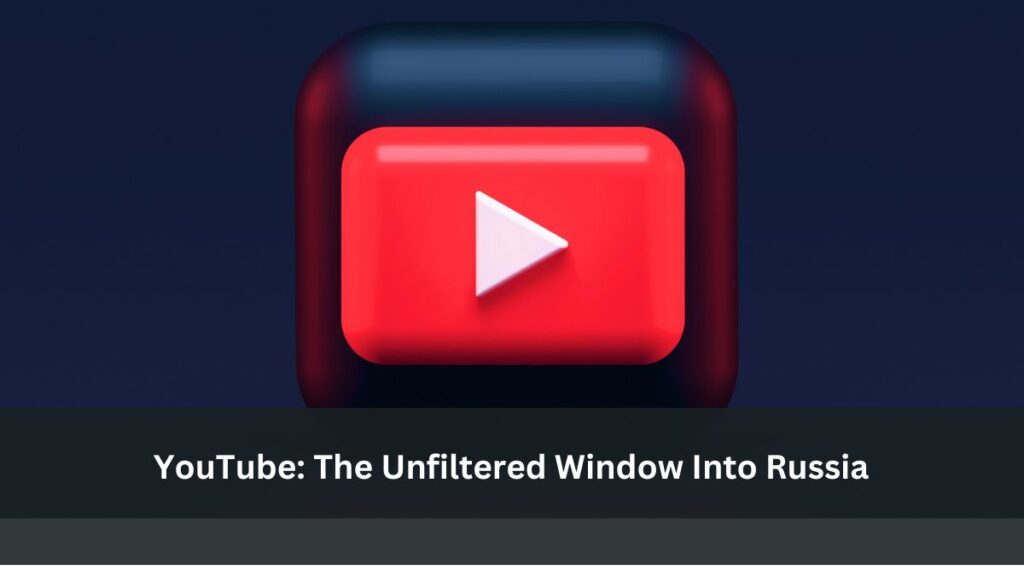In the tightly controlled media landscape of modern Russia, a single platform stands out as a bastion of free expression – YouTube. This video-sharing giant, owned by the American tech behemoth Google, has become an indispensable source of information and entertainment for millions of Russians, presenting a formidable challenge to the Kremlin’s stranglehold on domestic narratives.
As Vladimir Milov, a former Russian deputy minister and Alexei Navalny associate, attests, “With minimal resources, we were essentially able to establish a direct competitor of Putin’s propaganda television. We are still behind them, but we are breathing down their back.” (WIRED, 2024) His words encapsulate the transformative power of YouTube in a nation where traditional media is tightly controlled by the state.
A Voice for the Opposition
For years, Alexei Navalny, the late opposition leader, leveraged YouTube to reach the Russian populace with his scathing critiques of the Putin regime. His exposé on the lavish “Putin’s Palace,” which alleged the misappropriation of billions of rubles, garnered over 132 million views – a remarkable feat in a country with a population just shy of 150 million.
Navalny’s success on the platform was not an isolated incident. As Milov recounts, “Our message gets through to the Russian people. We are serving as a very effective alternative broadcasting tool that really competes with Putin’s propaganda.” (WIRED, 2024) From economics to human rights, a constellation of opposition voices has found a home on YouTube, reaching millions of Russians with narratives that defy the Kremlin’s narrative.
On a personal note, I vividly recall the first time I stumbled upon one of Navalny’s videos. Intrigued by the bold allegations and slick production value, I found myself drawn into a world of dissent that mainstream Russian media had carefully obscured. It was a revelatory moment, a realization that the truth could still find its way to the Russian people, despite the regime’s best efforts to suppress it.</blockquote> <H2>A Lifeline for Independent Media</H2>
Beyond political opposition, YouTube has become a haven for independent media outlets struggling to operate in an increasingly hostile environment. Organizations like Meduza, the BBC’s Russian service, and OVD-Info have amassed millions of subscribers, providing an alternative to state-sanctioned narratives.
However, this virtual sanctuary is far from secure. The Kremlin has made concerted efforts to stifle dissenting voices on the platform, with Google reporting that it has received hundreds of thousands of removal requests from Russian authorities since the invasion of Ukraine in 2022. (Google Transparency Report, 2023)
Despite facing immense pressure, YouTube has shown resilience in upholding its commitment to free speech. As a spokesperson stated, “If we have concerns that legal requests are being used to silence dissidents, we will push back.” (WIRED, 2024) This stance has garnered praise from human rights organizations, who have called on Google to continue resisting censorship efforts by the Russian government.
In a bold move to circumvent Kremlin censorship, a group called the Denis Diderot Committee has achieved a remarkable feat – securing a deal with satellite provider Eutelsat to broadcast independent Russian news and content directly into the region. As Jim Phillipoff, one of the committee’s founders, explained, “The goal of our project is to circumvent this control.” (WIRED, 2024)
This “Svoboda Satellite Package,” utilizing the Russian word for “freedom,” has already begun broadcasting to millions of households in Russia and the broader region. By rebroadcasting existing channels and creating new ones from dissident YouTube content, the committee aims to provide an uncensored window into the reality of the Russian experience.
A Battle for Truth
The Kremlin’s struggle to rein in YouTube is a microcosm of the broader information war raging within Russia’s borders. As state-controlled media outlets lose credibility and Russians increasingly turn to online sources, the regime faces an uphill battle to maintain its grip on the narrative.
While the future remains uncertain, one thing is clear: YouTube has emerged as a potent force for free expression in Russia, a virtual agora where dissenting voices can resonate and the truth can find a foothold. Whether through grassroots opposition channels or satellite broadcasts, this platform represents a beacon of hope for those yearning for an unfiltered perspective on their nation’s reality.
In the words of Vladimir Milov, “They will not kill us by just shutting down one thing and making the other cooperate with the regime. We’ll navigate through.” (WIRED, 2024) This defiant spirit, amplified through the digital realm, serves as a rallying cry for all those who refuse to surrender their right to seek and share the truth.

